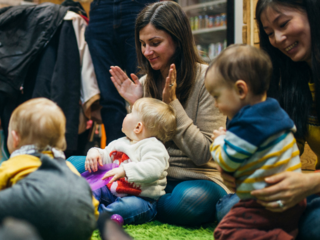Friends
Tips for the New Mom With Zero Friends
Why don't they call me anymore?
Posted January 28, 2022 Reviewed by Davia Sills
Key points
- A baby can change your life in a lot of ways, but that doesn't mean that you have to lose all your pre-parenthood friendships.
- Making an effort to stay connected to old friends can be good for your mental health.
- Seeking out opportunities to meet and build friendships with other parents can also help you through parenthood.
As with everything in life, friendships evolve over time. Another arguably universal truth in life is that change is the only constant. Having children is a big change in one’s journey, and it can certainly affect friendships. Kids can be a major turning point in friendships, especially if your friends are not interested in childbearing and the “lifestyle” such responsibility brings. Rather than thinking of this as a negative disconnect, try to find value in the different stages of life you and your friends are in.

As a new parent, your baby becomes your entire world. You likely could spend the entire day studying the minor changes in expression on your baby’s face or watching them begin to observe the world around them. To be frank, your non-mom friends may find what is so magical to you a bit boring to hear about.
It may be difficult for you to connect with them about the new emotions you are feeling since they have not had that experience themselves and may not be interested in ever having children. They may also have trouble reconciling the decrease in interaction between the two of you since the birth of the child. These types of issues are fairly common because most people are inherently more self-involved than you may realize.
If you are feeling disconnected from the friends you had pre-motherhood, the tips below offer some advice on how to manage:
Parenthood changes you.
Your parental instincts have kicked in, and you are living a totally new existence. This transformation into a “super parent” is likely difficult for your friends to comprehend if they are not parents themselves.
This doesn’t mean kidless friends will be unsupportive; good friends will hold space for you and ask how you are doing with parenthood. However, be aware that you may feel more alienated by sharing with someone who hasn’t had the same life-altering experience. If you are looking for validation for your parenting journey, I recommend talking to someone who has chosen the path of parenthood.
New babies set your schedule and will do so for the foreseeable future.
While your time is no longer your own, and you have much less time for socializing, there are still ways to connect with friends. They say, “Sleep when the baby does,” but you can also use that time for a much-needed self-care phone call with a friend.
Make an effort to connect, and you may be surprised by the outcome. Talk to your friend about the differences and similarities you both currently share. An adult conversation may be as recharging and refreshing as a nap!
Raising children is a great time to make new friends.
I recommended putting yourself in a position to meet new “parent friends.” Connect with other families in daycare by setting up playdates or signing up for a “mommy and me” class. The individuals you meet in these places will have many shared experiences with you and will enjoy talking about your kids and parenting in general.
It is comforting and therapeutic to trade kid “war” stories about the frustrations and “wins” of parenting, everything from breastfeeding to potty training. The connections you make in kid-friendly zones may be the “village” you need while raising your child.
If you want to try to include your non-parent friends on your baby journey, do so in a supportive way.
Ask them to participate in a way that might make them feel loved and cherished. For example, ask your friend to hold your baby while they sleep or feed them if they are using a bottle. Feeding and sleeping are easy and great bonding moments for individuals who do not have a lot of baby experience.
As the child grows, include your friend by asking them to teach your child about what they do for work or helping your child accomplish a task, such as making a sandwich or doing a household chore. This allows for one-on-one bonding between your friend and your child.
Ask your non-parent friends their opinions about important matters when they are knowledgeable about the topic.
Maybe they live in a school district you are interested in or have personal experience with something your child is going through. Keep your advice-seeking to areas they are knowledgeable in, as seeking parental advice from non-parents may be more detrimental than helpful to the friendship. When you are tired and working hard to raise your child, it is easy to assume that your friends should be sympathetic. This is not a fair assumption, however, as they chose not to have children and do not share this particular journey with you.
Often people without children do want to have them but haven’t had the opportunity to do so.
This could be due to a struggle to find the right partner or issues with fertility. Many people feel a great deal of shame regarding childbearing. Please keep this in mind when navigating sharing your experience with others. Do not be alarmed if they pull back during your transformation into parenthood, and be empathetic of their feelings and struggles.
Do not fight, but rather embrace the fact that friendships change and evolve. Seize the opportunity of raising children to expand your social circle and make new, like-minded friends. Having children doesn’t necessitate saying goodbye to non-parent friends. However, much of the effort to maintain an old friendship postpartum will often be on you, even though you are the one “with less time.”
As a general rule, never expect someone else to do something that you want to see accomplished. So make an effort to reach out; call that friend you’ve been meaning to call. It may not be a wild night at the club, but it can be a lot of fun to reminisce about the good times you have shared and revel in what used to be… when you weren’t thinking about changing diapers.




